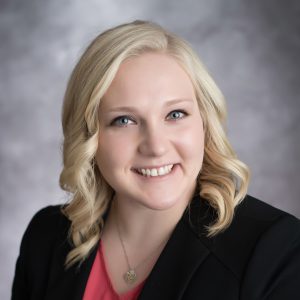Maternal Infant Health Program Ignited Passion for Obstetrical Care
by Lauren Buhr
I am enthusiastic about participating in the TIP program because it would challenge me to develop my professional and clinical skills in an environment in which I hope to continue my residency training. As a student who intends to practice Family Medicine with OB, I am seeking a residency program that offers a perfect complement of both rural and obstetrical practice. With the additional exposure to the community during my fourth year of medical school, I will be able to learn about health disparities that face the population and acclimate to the public health resources available to alleviate those needs. The skills and knowledge that I will gain through participating in the TIP program will improve my clinical expertise, as well as enable me to be a supportive leader among my colleagues and the community — goals that I have been building toward throughout my education.
By serving various communities, I have developed communication and leadership skills that have enabled me to form relationships with people who have a vast spectrum of backgrounds and abilities. As an undergraduate resident hall assistant, I was challenged with having a resident who was legally blind. To promote inclusion, I planned hall programs that were multi-sensory and sought out one-on-one communication instead of using social media. This made me more aware of how to tailor my interactions based on individuals’ needs and values to maximize their success. As a family doctor, I know these skills will help me to form relationships with patients and customize my clinical approach based on their beliefs, education, and socioeconomic level.
The College of Human Medicine’s Rural Community Health Program (RCHP) helped me to develop skills as a leader within my community as well. During my clinical training in Alma, Michigan, I have continued my work as a public health advocate at the local health department, where my involvement with the Maternal Infant Health Program ignited my passion for obstetrical care. Additionally, I have observed county-wide health inequities, such as poor literacy. As a result, I am planning a book drive that will provide books to impoverished Gratiot County children. Alleviating health disparities through research and problem solving demonstrates how I, as a rural family doctor, will maximize the physical, mental and economic health of my community.
My experience with maternal infant health has also shaped my personal relationships. During my first year of medical school, a high school friend called me; through her tears she confided in me about an unplanned pregnancy and a broken relationship. I listened as she expressed all of her concerns regarding her parents’ reaction, finances, her relationship with the child’s father and where to get prenatal care. During our conversation, I realized that in her moment of conflicting emotions, she just needed someone to listen, try to understand and not place judgment. As her pregnancy continued, I attended prenatal appointments with her, supported her decision to involve the child’s father and visited her after she gave birth. Forming these longitudinal relationships with women and their families is highly rewarding to me, and thus practicing obstetrics is an essential component in my career as a family physician.
Not only am I devoted to a career in rural Family Medicine, but I am a hardworking, trustworthy student who values leadership through service, inclusiveness and lifelong learning. I enjoy spending time with my family and my dog, cooking, and attending Michigan State athletic events. Throughout my medical school journey, I am proud of my academic successes, but I am even more pleased with my ability to balance study, service, family and fun. I am confident that the TIP program will serve as an extraordinary foundation as I establish my Family Medicine career in a place that I consider truly home – rural Michigan.



